Brightpearl vs NetSuite
July 02, 2023 | Author: Michael Stromann
5
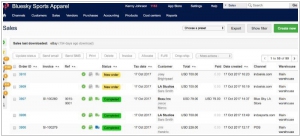
Brightpearl gives you a central hub to help you manage the heart of your business - orders, inventory, customer data, accounting and reporting all together in one place. Reduce manual operations and manage your orders from multiple sales channels in one place. Enjoy full print, pick, pack and ship functionality and integrate with multiple leading carriers globally.
21
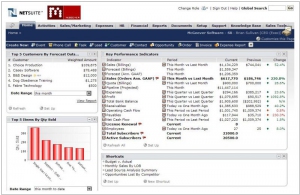
NetSuite is the leading vendor of cloud-based Software-as-a-Service integrated business management software for mid-market enterprises and divisions of large companies. NetSuite's cloud business management system including ERP / accounting, order management / inventory, CRM, professional services automation (PSA), and Ecommerce.
Brightpearl and NetSuite are both comprehensive business management platforms, but they differ in terms of their target audience, scalability, and feature sets.
Brightpearl is an all-in-one retail operations platform designed for mid-sized retailers and e-commerce businesses. It integrates inventory management, order management, CRM, accounting, and reporting into a single system. Brightpearl focuses on streamlining retail operations, providing real-time visibility into inventory levels, sales performance, and customer data. It offers robust features for managing multi-channel sales, inventory synchronization, and customer engagement.
NetSuite, on the other hand, is a more extensive enterprise resource planning (ERP) software solution that caters to businesses of all sizes, including large enterprises. NetSuite provides a wide range of functionalities across various departments, including finance, sales, marketing, supply chain, and human resources. It offers comprehensive features for financial management, inventory management, customer relationship management, and more. NetSuite is known for its scalability and flexibility, making it suitable for businesses with complex operations and extensive customization requirements.
See also: Top 10 Business Management software
Brightpearl is an all-in-one retail operations platform designed for mid-sized retailers and e-commerce businesses. It integrates inventory management, order management, CRM, accounting, and reporting into a single system. Brightpearl focuses on streamlining retail operations, providing real-time visibility into inventory levels, sales performance, and customer data. It offers robust features for managing multi-channel sales, inventory synchronization, and customer engagement.
NetSuite, on the other hand, is a more extensive enterprise resource planning (ERP) software solution that caters to businesses of all sizes, including large enterprises. NetSuite provides a wide range of functionalities across various departments, including finance, sales, marketing, supply chain, and human resources. It offers comprehensive features for financial management, inventory management, customer relationship management, and more. NetSuite is known for its scalability and flexibility, making it suitable for businesses with complex operations and extensive customization requirements.
See also: Top 10 Business Management software
Brightpearl vs NetSuite in our news:
2020. Brightpearl raises $33M to boost its platform for retailers
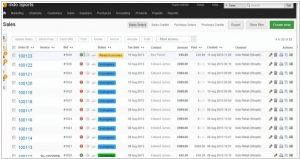
Brightpearl has secured $33 million in funding to accelerate its growth as a platform that empowers retailers to optimize their operations and drive sales. The startup specializes in developing a comprehensive solution that encompasses financial management, CRM, fulfillment, inventory and sales order management, purchasing and supplier management, as well as warehousing and logistics. The recent Series C funding round was led by Sage, a strategic partnership that will enable both companies to assist retail and e-commerce customers in leveraging top-notch cloud finance and retail management solutions. By combining their expertise, Sage and Brightpearl are committed to supporting businesses on their digital transformation journey, enhancing efficiency and success in the retail industry.
2016. Oracle buys cloud ERP provider NetSuite for $9.3B
Oracle has announced its acquisition of NetSuite for an estimated amount of $9.3 billion. As per a statement by Oracle CEO Mark Hurd, both Oracle and NetSuite's cloud service offerings, targeting enterprise customers, will continue to operate and coexist in the marketplace indefinitely. NetSuite, an established player in the cloud enterprise resource planning (ERP) sector, holds a prominent position with its offerings for supply and demand tracking, inventory management, accounting, customer relationship management (CRM), and HR solutions. The ERP industry has witnessed considerable mergers and acquisitions along with consolidation in recent years. Oracle, known for its aggressive acquisition strategy, has been actively acquiring smaller companies throughout 2016, including Opower and Textura.
2010. NetSuite fights hairballs. But makes one with Google Apps
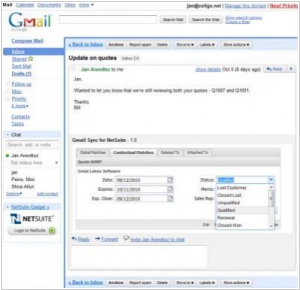
NetSuite marketing team is well known for its sense of humor. But before their humor was mainly inspired by SAP and its "stealth" launch of SaaS solution SAP Business ByDesign (that let NetSuite make its business). By the way, it's interesting that actually NetSuite drives away Oracle's customers as well as SAP's, but with respect to Oracle, the NetSuite marketers behave much more modest, because the Oracle CEO, Larry Ellison in co-owner of NetSuite. But let's go back to hairballs. What is it? According to NetSuite, the hairball - is a thing that happens when a company deploys disparate IT systems and then tries to integrate them. The conclusion is simple - use NetSuite, where everything is natively integrated. In addition to funny video NetSuite unveiled the updated system interface and seamless integration with Google Apps: ***
2009. Netsuite invented Social ERP
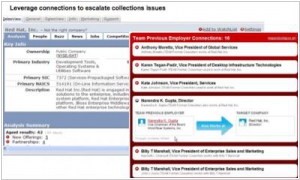
Netsuite has already missed the opportunity to use the Social CRM buzz. Salesforce and some other CRM vendors have already unveiled social features and launched the marketing promotions. But Netsuite has all chances to become the first to offer Social ERP. Today Netsuite and InsideView announced about the new partnership in order to create the Social ERP. But why do we need this social ERP software? Everything was clear with social CRM: salesperson needs to monitor customers and leads in the social networks in order to involve into the discussions and sell something. But why ERP, that is intended for resources accounting and planning, needs the similar features? Netsuite has found some answers to this question. ***
2009. Netsuite connects to SAP
Netsuite has unveiled OneWorld for SAP, a new product that provides SAP customers with the advantages of divisional Software as a Service (SaaS) while consolidating divisional data for aggregate reporting purposes. This solution empowers large enterprises to maintain their existing investments in legacy business applications while implementing a modern, web-based suite of business applications, resulting in cost reduction and increased competitiveness and productivity for their divisions. Netsuite aims to address the needs of multinational corporations by offering a flexible and functional solution that can be rapidly and cost-effectively deployed to business divisions. The company aims to provide software systems that are more adaptable, customizable, and flexible than those offered by the corporate parent company. At the core of this offering is SuiteCloud Connect for SAP, a product and service offering that bridges the gap between Netsuite data and SAP reporting. It enables the aggregation of data such as general ledgers and revenue information into SAP for consolidated reporting purposes.
2009. Netsuite created SuiteCloud Connect for Salesforce.com
NetSuite has announced a collaboration with third-party developers to introduce connectors that integrate its SuiteCloud suite with Salesforce.com CRM apps. These connectors enable users to seamlessly incorporate NetSuite applications into their collection of software as a service (SaaS) applications. SuiteCloud Connect comprises a range of integration applications that combine Salesforce.com's salesforce automation and customer relationship management software with NetSuite's online ERP suite. By establishing this connection, NetSuite aims to facilitate best-of-breed SaaS deployments. The integration with Salesforce.com is a logical step for NetSuite, as Salesforce.com boasts higher annual revenue and a larger user base. By reaching out to an audience already familiar with SaaS solutions, NetSuite expects to attract more customers to its platform.
2009. NetSuite delving into cloud computing
NetSuite, a provider of on-demand enterprise software services, is expanding its offerings to include cloud computing through its new service called SuiteCloud. In addition to hosting enterprise software on demand, NetSuite now allows customers to leverage cloud infrastructure for their IT needs. As part of its SuiteCloud Ecosystem, NetSuite is introducing a developer program called SuiteCloud Developer Network and an online marketplace for cloud computing applications called SuiteApp.com. The SuiteCloud platform is built on NetSuite's core enterprise resource management (ERP) software, along with its customer relationship management (CRM) and e-commerce solutions.
2009. NetSuite Created Online ERP for Retailers
NetSuite, a leading provider of on-demand ERP suites, is targeting North American retailers with its latest software suite designed for multi-channel businesses. The Multi-Channel Retail Management Suite offers a range of features to streamline operations, including the creation of web stores that seamlessly connect with physical retail locations. The suite provides a unified view of inventory, accounting, customer information, and package tracking, while also offering integration with eBay. Additional capabilities include marketing campaign tools, such as a "shopping cart abandonment" feature that enables businesses to send customers coupons for items left in their online shopping cart. Pricing for the suite varies based on the specific configuration requirements of each customer, according to the company.
2009. NetSuite boosts sales of OneWorld all-in-one business SaaS offering
NetSuite, a Business SaaS vendor, has announced several customer wins in the region for its integrated OneWorld SaaS offering, which combines accounting, ERP, CRM, and eCommerce functions. One of the new customers is Campus Living Villages, an Australian company that builds and operates student accommodations on campuses worldwide. NetSuite's OneWorld, launched in 2008, is recognized as the first on-demand system to provide real-time subsidiary management and business consolidation capabilities for mid-market companies, delivering them at a lower cost compared to traditional on-premise ERP solutions. The ability of OneWorld to offer local controls within each subsidiary while ensuring global visibility was a significant factor in winning the contract with Campus Living Villages. NetSuite aims to expand its market presence by appointing additional channel partners, particularly those capable of integrating its products with unified communications solutions. The integration of business applications and unified communication products and services is identified as a growth market by industry leaders like Avaya, Nortel, Cisco, and NEC.
2008. NetSuite's SaaS soln for SMBs
Proquest Solutions Pvt Ltd, the leading On-Demand solution provider in India, has introduced a special low-cost solution for small and medium-sized businesses (SMBs) during the economic slowdown. The solution offers NetSuite's integrated ERP, CRM, and E-commerce software starting at $6,000 for a 5-user pack, available for a limited time. NetSuite Inc., founded in 1998, provides on-demand business management software suites for midsize companies, allowing them to manage various operations in a single hosted system. Proquest Solutions aims to address the challenges faced by Indian SMBs in uncertain economic times, offering a Software as a Service (SaaS) solution like NetSuite at an affordable price point, enabling a stronger return on investment (ROI). The localized NetSuite product meets Indian statutory requirements, bridging the gap for existing clients. With over 2,000 subscribed licensed users of NetSuite in India and growing, the success of the product and SaaS model is evident. As the SaaS market in Asia is projected to reach $1.16 billion by 2010, Proquest Solutions believes Indian businesses are interested in SaaS due to its cost-effectiveness, "anytime, anywhere" access, and efficiency in managing various business operations. This allows cost-conscious companies to experience rapid growth while reducing their total-cost-of-ownership for business systems.



